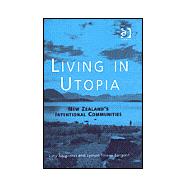
Note: Supplemental materials are not guaranteed with Rental or Used book purchases.
Purchase Benefits
What is included with this book?
| List of Tables | ix | ||||
| Acknowledgements | xi | ||||
| Preface | xiii | ||||
| 1 Introductions | 1 | (10) | |||
|
1 | (1) | |||
|
2 | (4) | |||
|
2 | (3) | |||
|
5 | (1) | |||
|
6 | (3) | |||
|
7 | (1) | |||
|
8 | (1) | |||
|
9 | (2) | |||
| 2 Contexts: New Zealand as a Utopia | 11 | (10) | |||
|
11 | (1) | |||
|
11 | (1) | |||
|
12 | (3) | |||
|
15 | (1) | |||
|
16 | (1) | |||
|
17 | (1) | |||
|
17 | (1) | |||
|
18 | (3) | |||
| 3 The Early Days: The Nineteenth Century | 21 | (12) | |||
|
21 | (1) | |||
|
21 | (1) | |||
|
22 | (1) | |||
|
22 | (1) | |||
|
23 | (1) | |||
|
24 | (1) | |||
|
24 | (4) | |||
|
28 | (2) | |||
|
30 | (3) | |||
| 4 The Twentieth Century: Beeville, James K. Baxter and the Ohu | |||||
|
33 | (1) | |||
|
33 | (1) | |||
|
33 | (5) | |||
|
38 | (3) | |||
|
41 | (6) | |||
|
47 | (2) | |||
| 5 Religious and Spiritual Communities | 49 | (30) | |||
|
49 | (5) | |||
|
54 | (8) | |||
|
54 | (6) | |||
|
60 | (1) | |||
|
61 | (1) | |||
|
62 | (1) | |||
|
63 | (5) | |||
|
63 | (1) | |||
|
63 | (2) | |||
|
65 | (1) | |||
|
66 | (2) | |||
|
68 | (2) | |||
|
70 | (3) | |||
|
70 | (2) | |||
|
72 | (1) | |||
|
73 | (1) | |||
|
74 | (2) | |||
|
76 | (3) | |||
| 6 Cooperative Lifestyles | 79 | (34) | |||
|
79 | (1) | |||
|
80 | (3) | |||
|
83 | (10) | |||
|
83 | (1) | |||
|
84 | (3) | |||
|
87 | (1) | |||
|
88 | (2) | |||
|
90 | (1) | |||
|
91 | (2) | |||
|
93 | (4) | |||
|
95 | (2) | |||
|
97 | (1) | |||
|
97 | (1) | |||
|
98 | (2) | |||
|
98 | (1) | |||
|
99 | (1) | |||
|
100 | (1) | |||
|
101 | (1) | |||
|
101 | (8) | |||
|
101 | (8) | |||
|
109 | (4) | |||
| 7 Environmentalist Communities | 113 | (26) | |||
|
113 | (1) | |||
|
114 | (2) | |||
|
116 | (1) | |||
|
117 | (7) | |||
|
123 | (1) | |||
|
123 | (1) | |||
|
124 | (3) | |||
|
124 | (1) | |||
|
125 | (2) | |||
|
127 | (4) | |||
|
127 | (1) | |||
|
128 | (1) | |||
|
129 | (2) | |||
|
131 | (3) | |||
|
132 | (1) | |||
|
133 | (1) | |||
|
134 | (5) | |||
| 8 Conflict and Longevity | 139 | (18) | |||
|
139 | (1) | |||
|
140 | (1) | |||
|
141 | (3) | |||
|
141 | (2) | |||
|
143 | (1) | |||
|
144 | (2) | |||
|
146 | (6) | |||
|
147 | (1) | |||
|
147 | (3) | |||
|
150 | (2) | |||
|
152 | (1) | |||
|
153 | (4) | |||
| 9 Conclusion: What Have We Learned? Lasting Lessons from New Zealand | 157 | (28) | |||
|
157 | (2) | |||
|
157 | (1) | |||
|
158 | (1) | |||
|
159 | (4) | |||
|
159 | (1) | |||
|
160 | (1) | |||
|
161 | (2) | |||
|
163 | (1) | |||
|
163 | (19) | |||
|
163 | (5) | |||
|
168 | (4) | |||
|
172 | (2) | |||
|
174 | (1) | |||
|
174 | (4) | |||
|
178 | (3) | |||
|
181 | (1) | |||
|
182 | (3) | |||
| Appendix I: Katajuta Community Agreements | 185 | (2) | |||
| Appendix II: Recognised Forms of Land Ownership in New Zealand | 187 | (4) | |||
| Works Cited | 191 | (16) | |||
| Index | 207 |
The New copy of this book will include any supplemental materials advertised. Please check the title of the book to determine if it should include any access cards, study guides, lab manuals, CDs, etc.
The Used, Rental and eBook copies of this book are not guaranteed to include any supplemental materials. Typically, only the book itself is included. This is true even if the title states it includes any access cards, study guides, lab manuals, CDs, etc.